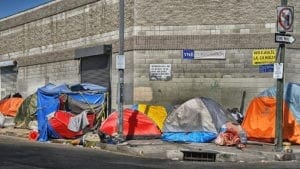Major Spike in LA Homelessness Doesn’t Change Attitudes of Central Planners
The homeless populations in both the county and city of Los Angeles are increasing so rapidly, elected officials say even they are “stunned.” But don’t expect anything other than more government spending, higher taxes and tighter regulations in the near future.
A year after celebrating a small decrease in homelessness, Los Angeles politicians have less to say now that a point-in-time count shows a 16 percent increase in the city and a 12 percent increase across the county. That brings the total number to nearly 59,000 countywide, with over 36,000 in the City of Angels.

What do you think?
Rate the degree to which government authorities should intervene on this issue:
Unlikely
Most likely

Nick
Author
Advocates for Self-Government is nonpartisan and nonprofit. We exist to help you determine your political views and to promote a free, prosperous, and self-governing society.
Subscribe & Start Learning
What’s your political type? Find out right now by taking The World’s Smallest Political Quiz.


























